Top 10 Worst Wars in History
War is a grim topic, but an important one to tackle. Understanding the scale, devastation, and consequences of these conflicts helps us grasp the sheer weight of human choices, geopolitics, and, unfortunately, the darker sides of our nature.This, however, isn't just about doom and gloom. It's about learning and awareness. If history teaches us anything, it's that we're bound to repeat mistakes if we're not vigilant. So, as you go through this list, consider what led to these devastating wars and what could have been done differently.
 The conflict resulted in the loss of an estimated 70–85 million lives, which was approximately 3% of the world's population at that time. It was marked by atrocities such as the Holocaust, where six million Jews were exterminated. Cities across Europe and Asia were reduced to rubble, impacting millions and disrupting civil life on an unprecedented scale.
The conflict resulted in the loss of an estimated 70–85 million lives, which was approximately 3% of the world's population at that time. It was marked by atrocities such as the Holocaust, where six million Jews were exterminated. Cities across Europe and Asia were reduced to rubble, impacting millions and disrupting civil life on an unprecedented scale. The only war that had nuclear bombings in it was World War II. This war had the most casualties in human history and involved the most countries. All of the Americas, all African states at the time (Liberia and Ethiopia), all countries in the Middle East (except Yemen), all countries in Asia (except Tibet, Bhutan, and Afghanistan), all Oceania countries, and almost all of Europe participated (with the exception of the Baltic states, Sweden, Switzerland, Vatican, Andorra, Spain, Portugal, and Liechtenstein - even though the Japanese invaded their Timor colony). The most casualties were in the Soviet Union and China. Multiple atrocities were committed during the war. For example, my great-grandmother's house was bombed during the Battle of Britain. This war shaped the Cold War and most of the modern-day world.
 This war saw the first large-scale use of chemical weapons and tanks, leading to widespread suffering and death. It resulted in an estimated 16 million deaths and 21 million wounded, not to mention the psychological toll it took on an entire generation. The war led to the collapse of empires and a re-drawing of national boundaries, sowing the seeds for future conflicts.
This war saw the first large-scale use of chemical weapons and tanks, leading to widespread suffering and death. It resulted in an estimated 16 million deaths and 21 million wounded, not to mention the psychological toll it took on an entire generation. The war led to the collapse of empires and a re-drawing of national boundaries, sowing the seeds for future conflicts. I'm not sure about the death toll, but for sheer horror, WWI is definitely worse than WWII. A sampling of the horrors includes poison gas, trenches, mortars, bombs, machine guns, and tanks - most of them seen for the first time.
WWII was bad for sure, but it also shaped the way the world is today, further elevating the US, the next generation, and the women's movement, to name a few.
World War I was the deadliest conflict ever. It killed 17 million people. It was thought to be the war to end all wars because of the deadly impact on countries. The Allies won.
 Lasting over a decade, these wars led to a conservative estimate of 3.5 million deaths, both military and civilian. The Continental System led to economic hardship and famine in several European countries. The invasion of Russia, marked by a disastrous retreat, demonstrated the human cost of military hubris, with the vast majority of the Grande Armée perishing.
Lasting over a decade, these wars led to a conservative estimate of 3.5 million deaths, both military and civilian. The Continental System led to economic hardship and famine in several European countries. The invasion of Russia, marked by a disastrous retreat, demonstrated the human cost of military hubris, with the vast majority of the Grande Armée perishing. You mean "Invasion of the Little Corporal."
 The use of Agent Orange and other herbicides by the U.S. led to long-lasting environmental damage and health issues among the Vietnamese population. The war resulted in an estimated 2–3 million Vietnamese deaths and over 58,000 U.S. military deaths. Widespread protests and a deeply divided American public marked the domestic response, eroding faith in the government.
The use of Agent Orange and other herbicides by the U.S. led to long-lasting environmental damage and health issues among the Vietnamese population. The war resulted in an estimated 2–3 million Vietnamese deaths and over 58,000 U.S. military deaths. Widespread protests and a deeply divided American public marked the domestic response, eroding faith in the government. This war sucked the fact America can't take on a tiny little commie country. This war made America look like a bunch of idiots. Communism is our biggest enemy and we couldn't take down some vietcong puckers.
Everybody was divided in those times. College students everywhere tried protesting, but the police stopped them dead in their tracks. Then, the U.S. government began conscripting, and a few of the lucky ones emigrated to the Great White North. If we could turn back time, this war would have never happened. (Also, we would have been more optimistic, and Annie would've been on Broadway sooner).
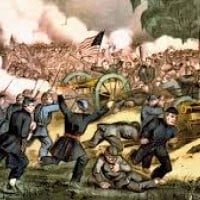 This conflict resulted in approximately 620,000 soldier deaths, more than any other war in American history. Slavery was a key issue, and the war led to the emancipation of nearly 4 million enslaved African Americans, but not without immense human cost. Families were often torn apart, fighting for opposing sides, and the southern U.S. was left in economic ruin.
This conflict resulted in approximately 620,000 soldier deaths, more than any other war in American history. Slavery was a key issue, and the war led to the emancipation of nearly 4 million enslaved African Americans, but not without immense human cost. Families were often torn apart, fighting for opposing sides, and the southern U.S. was left in economic ruin. The north really wanted the south to adapt to their way of life by taking the southern folks property away from them. This war created the madman John Wilkes booth.
This war was bloody, but it wasn't bad. I mean, I would prefer not to have any wars, but if it's to remove slavery - one of the worst things of all time - then so be it.
Yes, it was! It didn't matter how inaccurate muskets were. People had new weapons to mow down the enemy in brutal, nasty ways!
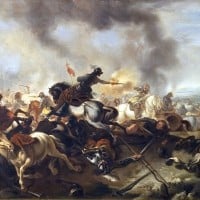 The war decimated the population of the Holy Roman Empire, with estimates suggesting that nearly 30% of its people were killed. In certain areas, up to 50% of the population died due to combat, famine, or disease. The war was marked by the frequent sacking of cities and towns, leading to widespread suffering and displacement.
The war decimated the population of the Holy Roman Empire, with estimates suggesting that nearly 30% of its people were killed. In certain areas, up to 50% of the population died due to combat, famine, or disease. The war was marked by the frequent sacking of cities and towns, leading to widespread suffering and displacement. Thirty years of hell and starvation completely depopulated huge areas in Germany. The reasons for the war are complex, and alliances shifted constantly. It started as an internal conflict, but soon foreign powers intervened for various reasons, mostly to expand their wealth, influence, and power.
Cardinal Richelieu, the bad guy from the Three Musketeers, was the biggest influence behind the reason why the war escalated and lasted so long. In the end, the only ones who really profited from the war were France and Sweden.
Sweden became a great power for a while, after getting rich from war booty by plundering major German cities. France became the undisputed hegemon of Europe for the next 200 years, since there was no real opposition left on the continent.
It would take 150 years until the population of the German states was on the same level as before the war, and any centralized institutions de facto stopped existing.
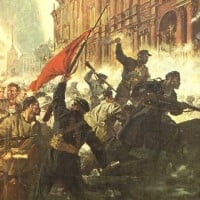 An estimated 7–12 million casualties were sustained, a significant portion of which were civilians. The conflict led to widespread famine, notably the Russian Famine of 1921, which cost an additional several million lives. The Red Terror and the White Terror contributed to political repression and extrajudicial killings.
An estimated 7–12 million casualties were sustained, a significant portion of which were civilians. The conflict led to widespread famine, notably the Russian Famine of 1921, which cost an additional several million lives. The Red Terror and the White Terror contributed to political repression and extrajudicial killings. This was the worst European war after WW1 and WW2. Millions were killed, the war had more than 10 teams, and it covered an area of 20 million kilometers. I can't find a worse European war, excluding the world wars.
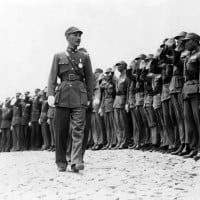 The conflict led to an estimated 2–3 million military deaths and a much higher number of civilian casualties. Widespread poverty and displacement were rampant, as families and communities were torn apart. Hyperinflation and economic hardship gripped the country, leading to additional suffering.
The conflict led to an estimated 2–3 million military deaths and a much higher number of civilian casualties. Widespread poverty and displacement were rampant, as families and communities were torn apart. Hyperinflation and economic hardship gripped the country, leading to additional suffering. This war is what turned democratic China into a communist state.
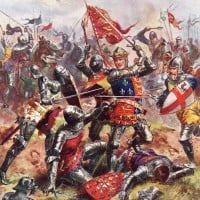 The lengthy conflict drained the resources of both England and France, leading to economic hardship for commoners. Heavy taxation to fund the war led to revolts and social unrest in both countries. The war also left a legacy of festering Anglo-French animosity, which persisted for centuries.
The lengthy conflict drained the resources of both England and France, leading to economic hardship for commoners. Heavy taxation to fund the war led to revolts and social unrest in both countries. The war also left a legacy of festering Anglo-French animosity, which persisted for centuries. How could they have a war for a hundred years? The idiots in the world should've realized that they should've stopped wars after this.
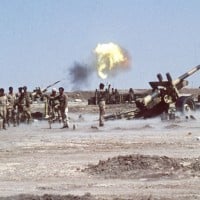 The conflict was marked by the use of chemical weapons against both combatants and civilians, notably by Iraq. It led to an estimated 1 million deaths and crippled the economies of both nations. Child soldiers were used, particularly by Iran, contributing to the conflict's high human cost.
The conflict was marked by the use of chemical weapons against both combatants and civilians, notably by Iraq. It led to an estimated 1 million deaths and crippled the economies of both nations. Child soldiers were used, particularly by Iran, contributing to the conflict's high human cost.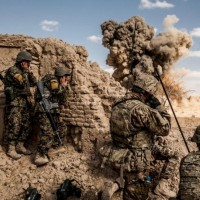 The protracted conflict led to tens of thousands of Afghan civilian deaths and displaced millions. The use of drone strikes led to unintended casualties, often affecting non-combatants. The instability allowed for the rise of extremist groups, affecting regional and global security.
The protracted conflict led to tens of thousands of Afghan civilian deaths and displaced millions. The use of drone strikes led to unintended casualties, often affecting non-combatants. The instability allowed for the rise of extremist groups, affecting regional and global security. So, Bush the Tush, you think it's good to blame an entire country for a terrorist attack.
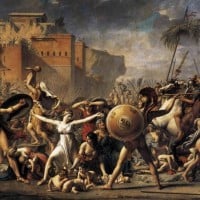 While the historical authenticity of the Trojan War is debated, its portrayal in epic poems like the "Iliad" depicts extensive loss of life and heroism tinged with futility. The famous story of the Trojan Horse exemplifies the deceit and trickery that led to the fall of Troy. The war, as described in myth, resulted in the deaths of legendary figures such as Hector and Achilles and brought ruin to the city of Troy.
While the historical authenticity of the Trojan War is debated, its portrayal in epic poems like the "Iliad" depicts extensive loss of life and heroism tinged with futility. The famous story of the Trojan Horse exemplifies the deceit and trickery that led to the fall of Troy. The war, as described in myth, resulted in the deaths of legendary figures such as Hector and Achilles and brought ruin to the city of Troy.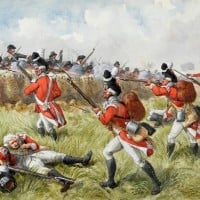 While the human cost was relatively lower compared to other wars, an estimated 25,000 American deaths still marked significant loss. The conflict left American cities like New York and Charleston heavily damaged and resulted in economic hardship due to blockades. The war also had global implications, encouraging revolutionary movements in other parts of the world.
While the human cost was relatively lower compared to other wars, an estimated 25,000 American deaths still marked significant loss. The conflict left American cities like New York and Charleston heavily damaged and resulted in economic hardship due to blockades. The war also had global implications, encouraging revolutionary movements in other parts of the world.
Any civil war is terrible. Brother fighting against brother should not happen. What makes this the worst is that we are still divided.
 The conflict has resulted in hundreds of thousands of deaths and the displacement of millions, creating one of the worst refugee crises in modern history. The use of chemical weapons on civilian populations drew international condemnation. Cities like Aleppo have been reduced to ruins, and countless cultural heritage sites have been destroyed.
The conflict has resulted in hundreds of thousands of deaths and the displacement of millions, creating one of the worst refugee crises in modern history. The use of chemical weapons on civilian populations drew international condemnation. Cities like Aleppo have been reduced to ruins, and countless cultural heritage sites have been destroyed.
When will the human race learn that war is stupid, pointless, and barbaric, and it kills the innocent? I mean, look at the Arauco War from 1536 to 1818, the longest at 282 years. Then there's the Hundred Years' War and the Thirty Years' War.